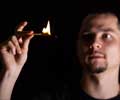The truth is often stranger than fiction.Have you ever heard of someone who likes to keep hair dryer on while sleeping or can’t move out of the house without puppets?Well, if such things fascinate you, there’s a lot in store

The show, which is set to premiere on December 29 on TLC, is a 12-part series that features people battling bizarre addictions, including a woman addicted to ventriloquism and one who can’t stop eating toilet paper, reports ABC News.
On the show, these women and others get help for their addictions, which they say consume their lives and interfere with relationships and everyday functioning.
Lori Broady, since she was eight years old, couldn’t fall asleep without the hair dryer turned on next to her in bed.
"It’s a comfort thing, it’s a security thing, it’s the noise, it’s the air, it’s all-encompassing," said the 31-year-old.
Another woman, April Brucker, is addicted to ventriloquism. She’s a professional ventriloquist who had trouble going anywhere without at least one of her eight puppets.
Advertisement
Los Angeles psychotherapist Mike Dow, said ’My Strange Addiction’ will show that addictions like eating toilet paper and sleeping with a blow dryer aren’t as rare as people may think, and that viewers can relate to them.
Advertisement
However, experts disagree about whether the behaviours the show’s participants exhibit are true addictions or cases of obsessive-compulsive disorder.
"These are more obsessions rather than an addiction. These obsessions are things that in general alleviate anxiety, and it has a place in the person’s psyche. That activity relaxes them. It’s something that they do becaue they’re worried that something terrible may happen," said Peter Martin, of the Vanderbilt University School of Medicine in Nashville.
Source-ANI











